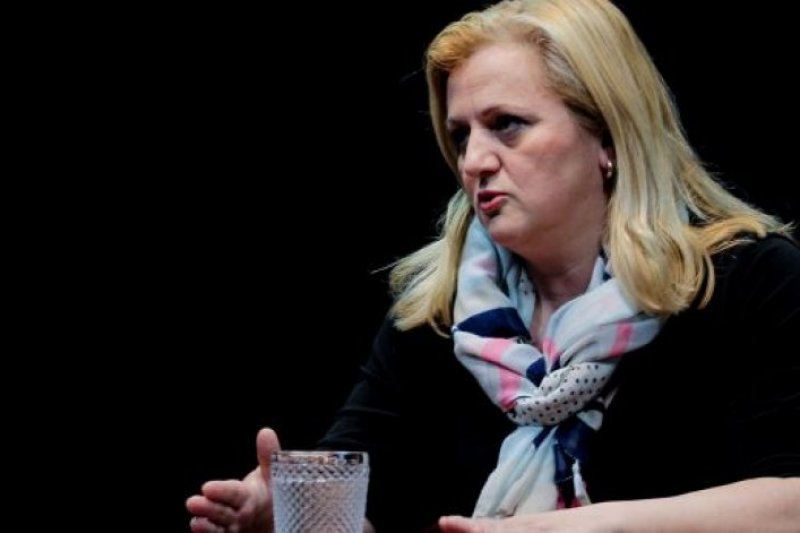‘Banjska Showed EU Who Is the Aggressor’
Albanian Daily News had an exclusive interview with Albanian Deputy in the Croatian Parliament, Ermina Lekaj-Perlaskaj who since the very beginning appreciated the visit of the Albanian President, Bajram Begaj to Croatia in April this year. According to her, Begaj declared that the relations between Albania and Croatia are at their best thanks to the excellent historical relations between the two countries.
“But the highlight of the event was that the two presidents Milanovic and Begaj visited Zadar on April 28 on the second day of the State visit and they visited Our Lady of Loretto Church and the Monastery of the Franciscan School Sisters in Arbanasi,” said Perlaskaj, who referred to the statement of President Milanovic that regardless of faith, Croats and Albanians are brothers and sisters.
In a comment of the terrorist attack of the Serb armed gang in north of Kosovo the Albanian MP in Croatian Parliament said that she agreed with PM Albin Kurti that that was a terrorist act by Serbia. “But without a doubt, after the latest events between Kosovo and Serbia, I think that the EU, together with our ally, the US, will have a different attitude towards Kosovo. The war in Ukraine and now these terrorist acts in Kosovo should be the impetus for the shortest deadline for Kosovo's accession in the EU and its bodies.”
Touching upon the stance of Croatia Mrs. Perlaskaj said that Zagreb is an unwavering supporter of Kosovo and it has been repeatedly expressed by the President and the Croatian government. But she thought that Albania should strongly take into consideration this fact and act in cooperation with Croatia, which is also a member of the European Union and can help for a stronger promotion of the integration processes for Kosovo.
The Albanian-Croatian Deputy warned that Belgrade, as an instrument of Russia, will continue to implement its policy of destabilization not only in Kosovo, but also in Montenegro and Bosnia and Herzegovina, and in general in the Western Balkans. But let's not forget that what happened last week has changed Kosovo's position because it showed the EU who is the aggressor. “I hope that Kosovo and Albania will work diligently so that Pristina maintains its position during the talks with Belgrade and proves in its presentation to the EU that the main culprit is not PM Albin Kurti but Serbian chauvinist politics,” said Albanian Deputy in the Croatian Parliament Ermina Lekaj- Perlaskaj in the following interview:
Albanian Daily News: After a two-month break, the Croatian parliament, where you are an MP, has recently started its work. Can you please tell us what will be its priorities in this season and secondly, what have been some of the achievements regarding the improvement of the rights of national minorities in Croatia and in this framework can you give us some details on the Albanian community that you represent?
Albanian MP in Croatian Parliament Ermina Lekaj-Perlaskaj: During this mandate, the Albanian community in 7 prefectures of the country has managed to own some objects, among which I would like to highlight several cultural houses. On the other hand, the first Kosovo-Croatia economic forum was held in Pristina, where more than 63 businesses from Croatia participated. In the commission for foreign policy and in that for European integration, the first session was held on the subject of Kosovo regarding the European integration with the objective that Croatia will be a supporter of these processes.
In the meantime, the April visit of the President of Albania, Mr. Bajram Begaj to Croatia was carried out and his talks with the highest state and government leaders served to strengthen the best friendly relations between our two countries. President Begaj held talks with his counterpart, Zoran Milanovic, and the focus was on strengthening cooperation, the European integration agenda as well as regional developments. Begaj declared that the relations between Albania and Croatia are at their best thanks to the excellent historical relations between the two countries and that Croatian investments are welcome. Furthermore, he said that the moment had come to have a direct airline between the two countries or a connection between the seaports.
But the highlight of the event was that the two presidents Milanovic and Begaj visited Zadar on April 28 on the second day of the State visit and they visited Our Lady of Loretto Church and the Monastery of the Franciscan School Sisters in Arbanasi. In the Monastery of the Franciscan School Sisters in the community of Arbanasi, the two presidents met with the residents, and were acquainted with the history of Arbanasi. Just to refresh the memory the Arbanasi were Albanians who settled on the outskirts of Zadar in the 18th century, and this part of the city was named after them. The similarities are greater than the differences between Croats and Albanians and, in the end I can refer to the first sentence which President Milanovic said in his address: “Regardless of faith, we are brothers and sisters”.
For his part Begaj told the residents of Arbanasi that their presence there for more than three centuries is an important fact which has contributed to strengthening friendly and historical ties between the two states and peoples.
-You said these days that the Croatian model for minorities, including the Serbian one, is a model that should be implemented in Kosovo as well. I referred to this at a time when the Pristina-Belgrade talks on September 14 in Brussels failed and the Association of the Serbian minority in the north of Kosovo was the main obstacle because Serbia insists on its creation first and then the implementation of the basic agreement, which is opposed by official Pristina. Please, how do you see this whole development, bearing in mind the experience of the creation of the Serbian Republic in Bosnia and Herzegovina and its consequences in this country?
- The talks between Kosovo and Serbia after September 14 will be different because after the terrorist act of the Serbian armed group in the north of Kosovo against the state police, the direction of them has. On top of all, Europe clearly understands who the aggressor is. As for the Croatian model, which is preferred for Serbian associations in Kosovo, it is not acceptable by the Serbian side since they are a cultural model in Croatia.
So, with the current rights, the Serbs in Kosovo have more rights, but they are looking for the same model as Bosnia, where they are a state within a state, and such a thing cannot be allowed in Kosovo.
My fellow Croatian MPs in the European Parliament are very active in lobbying for the recognition of Kosovo by the five EU countries, which continue not to recognize it and for its membership in the EU and other international organizations.
- While we are having this conversation an officer of the Kosovo Police was killed in the north of Kosovo, while another was injured in the attack on September 24. The Prime Minister of Kosovo, Albin Kurti, has called the attack a terrorist act, saying that organized crime with "political, financial and logistical support from official Belgrade is attacking our state." How do you consider this rise of the tension after the Brussels talks?
- I agree with PM Albin Kurti that this was a terrorist act by Serbia, and following the Serbian media during these days, I see that after such an act, the Serbian government has sacrificed Milan Radojicic, the vice chairman of the ‘Serbian List’ party and a confidant of President Aleksandar Vucic, seeing that he and his followers have not achieved the goal of destabilizing Kosovo.
I have clearly explained in the Croatian media that when Vucic talks about the political objectives of Kosovo, he is convinced of the accuracy of his lies and that he feeds the Serbian people with the mythology of Kosovo.
But without a doubt, after the latest events between Kosovo and Serbia, I think that the EU, together with our ally, the US, will have a different attitude towards Kosovo. The war in Ukraine and now these terrorist acts in Kosovo should be the impetus for the shortest deadline for Kosovo's accession in the EU and its bodies.
-Meanwhile, the statement of the president of Croatia, Zoran Milanovic, in his speech at the general debate of the 78th Session of the UN General Assembly that Croatia will lobby for the recognition of Kosovo, has drawn attention. In your opinion, should Tirana's diplomacy coordinate more its actions in support of Kosovo with countries like Croatia?
- Honestly, Croatia is an unwavering supporter of Kosovo and it has been repeatedly expressed by the President and the Croatian government. But I think that Albania should strongly take into consideration this fact and act in cooperation with Croatia, which is also a member of the European Union and can help for a stronger promotion of the integration processes for Kosovo.
- In conclusion, as an experienced researcher of the Western Balkans, do you think that against all these developments in the region, Serbia's efforts to create 'Greater Serbia' have increased and could Belgrade be able to realize a second Republic of 'Srpska' in region at the expense of Kosovo?
- Belgrade, as an instrument of Russia, will continue to implement its policy of destabilization not only in Kosovo, but also in Montenegro and Bosnia and Herzegovina, and in general in the Western Balkans. But let's not forget that what happened last week has changed Kosovo's position because it showed the EU who is the aggressor.
I hope that Kosovo and Albania will work diligently so that Pristina maintains its position during the talks with Belgrade and proves in its presentation to the EU that the main culprit is not Kosovo PM Albin Kurti but Serbian chauvinist politics. / ADN














